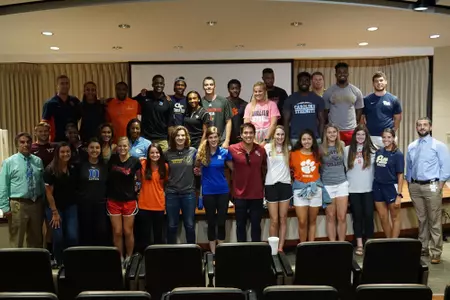
Different On The Field, SAAC Students Learn They’re All Alike
July 26, 2017 | Football, Softball, Devlin Student-Athlete Formation & Succe, #ForBoston Files
Smith and Frei attend ACC SAAC meetings to represent BC
In the heat of a year-long competition, college student-athletes only know opponents by their jersey or color. Each logo and team comes to represent something totally different with geography, style of play and collective identity masking the individual. As deep as the relationships go on their own teams, their opponents are never more than names on a roster.
But this past week, representatives from each Atlantic Coast Conference institution's Student-Athlete Advisory Council traveled to North Carolina and the heart of the ACC's geographic footprint. They met representatives from other schools to discuss new legislation and how it impacts their own school. In the process, they learned how every athlete handles similar opportunities and challenges. As different as they sometimes are on the field, the walls came down, revealing just how similar they are when they put their uniforms away.
"There were two representatives from each school," softball's Allyson Frei explained. "We discussed a lot of the legislation that was coming into play from the ACC and NCAA overall. As an ACC SAAC, we are allowed three representatives who are eligible to vote on the NCAA legislation, so as a group we really get to have a say in what takes place across college athletics."
"We had a great variety of sports attending, from field hockey, track and field, swimming and football to basketball and softball," football's Ray Smith said. "We were able to do a lot of things together and we discussed NCAA legislation and how it might affect student-athletes. It was a really great opportunity to meet a bunch of different athletes all around the ACC, and it was nice to be friends with them in a setting instead of bitter rivals on a field or court."
The conference brought together ACC students from all walks of life, each with their own perspective. As they talked about different legislative actions, including ones focused on time management, students from one sport realized that another sport handles things differently and on a completely different scope or schedule.
"It was very discussion based," Smith said. "We would start on one topic and lead into another topic, then another topic. We would really just keep talking while we were in the conference room. We had a great leadership talk from business leaders. And we had talks about leadership that we could go back to our respective institutions with a goal to install tactics into our schools and teams."
This year's discussion centered on time management. The NCAA passed a new rule governing time off for student-athletes. Dubbed "Flex 21," it requires all athletes to have seven days off at the end of a season with 14 additional days off during an academic year. It's a rule stemming directly from student-athlete involvement and participation.
"I've learned that time demand goes well beyond just practice," Frei said. "There are things that count towards our hours of sports work - film, meetings and other things that people don't necessarily think of with athletics. When that legislation came out, we could really see the impact that we had as athletes."
While it might not seem like much, that goes a long way for athletes across a multitude of sports. Depending on how their schedules work out, athletes face a much different college structure than others. It was an eye-opening experience for Smith, who explained that scheduling can be easier for him as a football athlete because of his meeting time and structure.
"All of our meetings are in the morning," he said. "So we can't schedule our classes until after 1 p.m. On one hand, that might limit our selection but we also know that we have a definitive schedule. Other sports that battle for pool time or court time have to have a more flexible practice schedule so they can potentially interfere with a class schedule. If a practice is in the middle of the day, they would have to go to class, go to practice and then go back to class. That's a full day."
By sharing those experiences and discussing with one another, it broke down the walls between competitors and rivals. It created relationships that led to the sharing of ideas and initiatives with the intention of bringing different aspects back to their own schools.
"It's a lot of legislation talk but we also talk about a lot of different initiatives," Frei said. "We discussed things like the Bone Marrow Drive, Project Life Movement and things we're looking to do again this year. There's a program called One Shirt, One Body. I realize how important service is at BC and I can tell we're one of the schools that really focuses on community service. It's what makes us special.
"I really liked getting to know the representatives from other schools," she continued. "We really got a good idea for how their SAACs are run and how things are run on their campuses. It's interesting to hear how they balance school and how things are run that I wouldn't know about otherwise. We all go through a lot of the same things across the ACC, and we're able to relate to one another in those aspects."
"BC is unique in its own way, but (all of the student-athletes) all have meetings, class and the restrictions," Smith said. "Being a student-athlete in general is very unique in and of itself."
Though they learned how other schools and sports operate across the board, it provided an opportunity to provide new outlooks within their own worlds. While at the conference, Frei roomed with a softball player from NC State and got to meet a representative from Virginia. Smith was one of five football players at the conference who represented Pitt, North Carolina, NC State and Duke. Of the other football players, all but the Duke representative played defense.
"Pitt and UNC both have to play Georgia Tech, so we all got to talk about the different teams we see during the year," he said. "And we got to talk about how it's an unbelievable world of coaching in college football. Ben Albert, for example, recruited me to BC and is now a coach at Duke, so we got to share stories of how everyone is interconnected like that."
For both Frei and Smith, the conference only made them long to return to Chestnut Hill, however, to get started on their respective athletics journeys. Smith is due to return to the gridiron next week when football season officially commences with preseason practice, while Frei awaits the start of school and fall practice.
"I think it's great that all of our athletes, at BC and across the ACC, are able to be student-athletes," Frei said. "We see that everyone is dealing with the academics and athletics balance. We all have a ton on our plates, but we know that it's all worth it in the end."
"It's really cool to spend the last days before fall practice with other athletes from their ACC schools," Smith added. "It was fun; we had activities like going to Top Golf and it was just a really fun time. But talking to all of the fall sports, we're all very excited to get over the summer break. For us, picking up where we left off in spring practice, our entire team is very excited, and - for us with football - we all are looking forward to getting back to hitting people again."
But this past week, representatives from each Atlantic Coast Conference institution's Student-Athlete Advisory Council traveled to North Carolina and the heart of the ACC's geographic footprint. They met representatives from other schools to discuss new legislation and how it impacts their own school. In the process, they learned how every athlete handles similar opportunities and challenges. As different as they sometimes are on the field, the walls came down, revealing just how similar they are when they put their uniforms away.
"There were two representatives from each school," softball's Allyson Frei explained. "We discussed a lot of the legislation that was coming into play from the ACC and NCAA overall. As an ACC SAAC, we are allowed three representatives who are eligible to vote on the NCAA legislation, so as a group we really get to have a say in what takes place across college athletics."
"We had a great variety of sports attending, from field hockey, track and field, swimming and football to basketball and softball," football's Ray Smith said. "We were able to do a lot of things together and we discussed NCAA legislation and how it might affect student-athletes. It was a really great opportunity to meet a bunch of different athletes all around the ACC, and it was nice to be friends with them in a setting instead of bitter rivals on a field or court."
The conference brought together ACC students from all walks of life, each with their own perspective. As they talked about different legislative actions, including ones focused on time management, students from one sport realized that another sport handles things differently and on a completely different scope or schedule.
"It was very discussion based," Smith said. "We would start on one topic and lead into another topic, then another topic. We would really just keep talking while we were in the conference room. We had a great leadership talk from business leaders. And we had talks about leadership that we could go back to our respective institutions with a goal to install tactics into our schools and teams."
This year's discussion centered on time management. The NCAA passed a new rule governing time off for student-athletes. Dubbed "Flex 21," it requires all athletes to have seven days off at the end of a season with 14 additional days off during an academic year. It's a rule stemming directly from student-athlete involvement and participation.
"I've learned that time demand goes well beyond just practice," Frei said. "There are things that count towards our hours of sports work - film, meetings and other things that people don't necessarily think of with athletics. When that legislation came out, we could really see the impact that we had as athletes."
While it might not seem like much, that goes a long way for athletes across a multitude of sports. Depending on how their schedules work out, athletes face a much different college structure than others. It was an eye-opening experience for Smith, who explained that scheduling can be easier for him as a football athlete because of his meeting time and structure.
"All of our meetings are in the morning," he said. "So we can't schedule our classes until after 1 p.m. On one hand, that might limit our selection but we also know that we have a definitive schedule. Other sports that battle for pool time or court time have to have a more flexible practice schedule so they can potentially interfere with a class schedule. If a practice is in the middle of the day, they would have to go to class, go to practice and then go back to class. That's a full day."
By sharing those experiences and discussing with one another, it broke down the walls between competitors and rivals. It created relationships that led to the sharing of ideas and initiatives with the intention of bringing different aspects back to their own schools.
"It's a lot of legislation talk but we also talk about a lot of different initiatives," Frei said. "We discussed things like the Bone Marrow Drive, Project Life Movement and things we're looking to do again this year. There's a program called One Shirt, One Body. I realize how important service is at BC and I can tell we're one of the schools that really focuses on community service. It's what makes us special.
"I really liked getting to know the representatives from other schools," she continued. "We really got a good idea for how their SAACs are run and how things are run on their campuses. It's interesting to hear how they balance school and how things are run that I wouldn't know about otherwise. We all go through a lot of the same things across the ACC, and we're able to relate to one another in those aspects."
"BC is unique in its own way, but (all of the student-athletes) all have meetings, class and the restrictions," Smith said. "Being a student-athlete in general is very unique in and of itself."
Though they learned how other schools and sports operate across the board, it provided an opportunity to provide new outlooks within their own worlds. While at the conference, Frei roomed with a softball player from NC State and got to meet a representative from Virginia. Smith was one of five football players at the conference who represented Pitt, North Carolina, NC State and Duke. Of the other football players, all but the Duke representative played defense.
"Pitt and UNC both have to play Georgia Tech, so we all got to talk about the different teams we see during the year," he said. "And we got to talk about how it's an unbelievable world of coaching in college football. Ben Albert, for example, recruited me to BC and is now a coach at Duke, so we got to share stories of how everyone is interconnected like that."
For both Frei and Smith, the conference only made them long to return to Chestnut Hill, however, to get started on their respective athletics journeys. Smith is due to return to the gridiron next week when football season officially commences with preseason practice, while Frei awaits the start of school and fall practice.
"I think it's great that all of our athletes, at BC and across the ACC, are able to be student-athletes," Frei said. "We see that everyone is dealing with the academics and athletics balance. We all have a ton on our plates, but we know that it's all worth it in the end."
"It's really cool to spend the last days before fall practice with other athletes from their ACC schools," Smith added. "It was fun; we had activities like going to Top Golf and it was just a really fun time. But talking to all of the fall sports, we're all very excited to get over the summer break. For us, picking up where we left off in spring practice, our entire team is very excited, and - for us with football - we all are looking forward to getting back to hitting people again."
Players Mentioned
Football: Head Coach Bill O'Brien Media Availability (October 7, 2025)
Tuesday, October 07
Football: Jeremiah Franklin Media Availability (October 7, 2025)
Tuesday, October 07
Women's Basketball: 2025 ACC Tipoff (Oct. 6, 2025)
Monday, October 06
Football: Pittsburgh Postgame Press Conference (Oct. 4, 2025)
Saturday, October 04
















